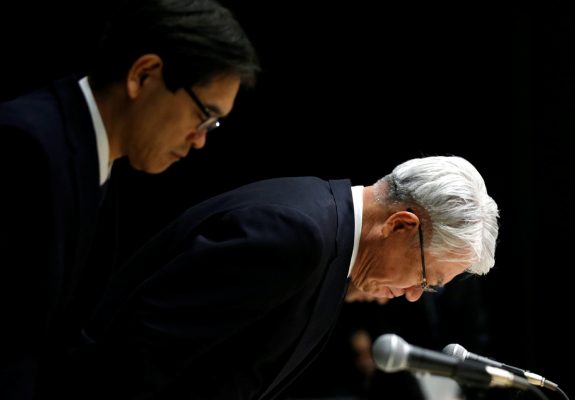
Data fabrication a new blow to the reputation of ‘made in Japan’
TOKYO – The head of scandal-hit Japanese steel-maker Kobe Steel, Hiroya Kawasaki, announced his resignation on Tuesday after the firm submitted false strength and quality data for products shipped to hundreds of clients worldwide.
Following a deep and prolonged bow in apology, Kawasaki told reporters: “As I think it’s best to go ahead quickly with reforms under new members, I … will step down from president on April 1 this year.
“We have caused trouble to many people. As soon as we can, we would like as many people as possible to think that Kobe Steel has changed,” added Kawasaki, who had been in the job since 2013.
“I’m really sorry.”
The firm has not yet named a successor.
In a long-awaited report into the scandal, the firm found that staff – including executives – changed inspection data, or made up data, before shipping their products.
The company has “deepseated issues” relating to its corporate culture and compliance, the report admitted.
“For over 112 years since its founding, the Kobe Steel group has managed its business has conducted its business by valuing the trust of its customers. … The recent loss of such trust is truly regrettable,” added the report.
The Kobe Steel report said it found 163 new cases of wrongdoing by its group.
“We will go back to our roots… and commit ourselves to making this moment a true turning point,” said the report.
The affected products included steel wires used in car engines and tires as well as aluminum used to manufacture Japan’s famous bullet trains.
Kobe Steel said its products, with falsified data about their strength and durability, had been sold to around 200 companies globally.
Investigations first revealed that Kobe Steel knowingly shipped at least 20,000 tons of aluminum and copper products with fabricated inspection data. The products were sent to around 200 companies.
Widespread impact
In Japan, major railway operators Central Japan Railway and West Japan Railway have stated that their Shinkansen bullet trains contained aluminum parts sourced from Kobe Steel that did not meet industry standards.
Beyond automakers and trains, Kobe Steel has also been implicated in fabricating data for aerospace and defense-related products.
Along with domestic firms such as Toyota Motor, Nissan Motor, Honda Motor and major Japanese railway operators, the scandal has also affected overseas companies including General Motors, Ford Motor, Airbus and Boeing.
These companies have been undertaking investigations to see if their products have been adversely affected by Kobe Steel’s erroneous data inspection practices.
Kobe Steel was founded in 1905 and has been a bastion of Japan’s manufacturing sector.
The revelations of the data fabrication scandal, however, has cast doubts over corporate governance in the manufacturing industry and beyond in Japan, and cast ghastly shadows over Japan’s once stellar reputation for precision manufacturing, experts here said.


